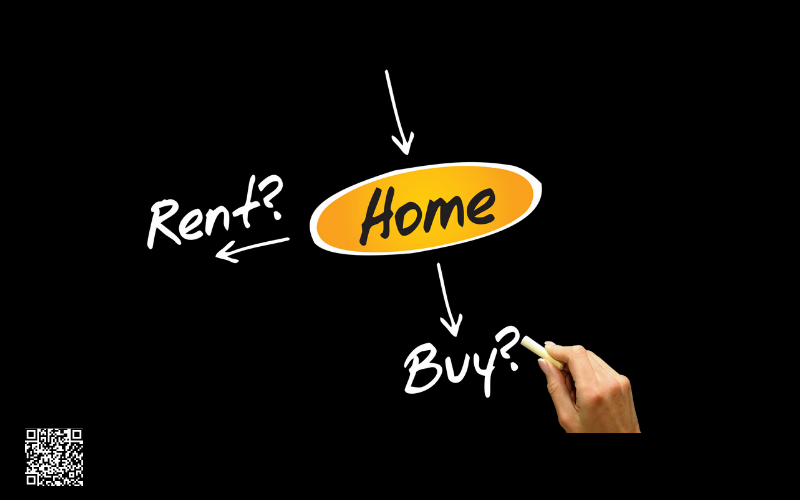From Andrew Carnegie and Franklin D. Roosevelt to Warren Buffet — these investing icons never really talk about renting. It’s always buy this, buy that in their motivation quotes.
But, should you take these types of advice literally or as just grains of salt? There are so many circumstances in your life (and in the market) that will affect whether you buy or rent a house. What worked for famous investors like Carnegie, Roosevelt, and Buffet worked for them. The same strategy might work for you but it also might not.
So, we can’t answer if buying vs. renting is better. But, we can help you answer if buying vs. renting a house is right for you. This article will cover some basic questions that you’ll need to ask yourself, how the current housing market is looking, and the advantages and disadvantages of each strategy.
Important Questions to Consider
This section will help you achieve a clearer understanding of where you stand when it comes to buying vs. renting a house. The more thought you put into your answers, the more prepared you’ll be to make the best decision.
What is My Top Financial Priority?
Buying a house will slow down your ability to reach other financial goals and may put strains on your current life. Other priorities could include pre-existing debts, saving for retirement, or creating an emergency fund.
Assess your competing financial goals, and decide which ones should be prioritized. Remember, there’s no wrong answer — it’s just whatever you consider your top financial priority.
Can I Afford the Down Payment and Closing Costs?
Renting only requires one month’s worth of rent in savings. For a house, you’ll need at least 6% (as a bare minimum) of the home’s value in savings to be considered. If you want to be approved for a reasonable rate, most experts suggest a 20% down payment. The smart option is to continue saving until you can afford a 20% down payment.
If you can’t afford the down payment and closing costs — renting is always a viable option.
How Long Will I Live Here?
If you can’t afford to pay long-term or will be moving in the near future, you may not want to buy a house. Most brokers recommend holding onto a home for 5 to 7 years to just break even. After those 5 to 7 years, the longer you hold your house — the more profit you’ll likely see.
Will I Qualify For A Good Mortgage Deal?
You’ll need a decent income and a strong credit score to avoid paying hefty mortgage interests. If you don’t have a strong credit score, you may want to consider spending a few months to a year rebuilding your credit. After all, the average mortgage will last 30 years — with the interest rate ranging from 3% to 10%.
How Do Home and Rent Prices Compare?
Looking at the local housing market, you’ll get a better idea of which move to take. If rent prices are skyrocketing with no signs of halting, a mortgage starts to look much more appealing. If the local market is a seller’s market, with high demand and prices, you’re probably better off just renting.
Am I Ready to Sacrifice Flexibility?
Renters aren’t tied down to a single spot, but homeowners are. If you receive a new job offer, you can even move across the country without much of a hassle. But, if you own a home, you’ll probably want to sell your home first or it might lose value.
Am I Ready to Handle New Responsibilities?
If you’ve already got a lot of responsibilities — whether it’s the kids or work — buying a house can add lots more. When juggling lots of responsibilities, you will risk burnout and emotional exhaustion. As a result, you may buy a house but then neglect to take proper care of it.
The Current Housing Market
The U.S. is a hot seller’s market. There are millions of interested home buyers looking to buy, and they don’t mind the increased costs associated with owning. From an investing standpoint, it’s not advisable to buy homes right now.
According to a recent LendingTree study, the median housing cost was lower for renters than house owners in all 50 of the largest metro areas. House prices are increasing while rent prices are decreasing due to the heavy number of vacancies seen in cities.
It’s important to note that this study looked primarily at metro areas. If you find yourself looking at suburban or countryside homes — you’ll want to do extra research on the particular neighborhood.
Pros of Renting A Home
- Freedom to move whenever you want
- May be cheaper than a mortgage payment (again, depending on where you live)
- No need to pay for maintenance
- Allows you to focus on other financial goals
- Less responsibility than owning
- Less savings required
- No risk of home price depreciation
- Freedom to move or downsize based on your needs
Cons of Renting A Home
- Walking away with nothing at the end of the day
- Rent will rise overtime
- Less stability
- A decreased sense of community
- Restrictions (e.g. no renovations, no pets, etc.)
- Chances at having an unfair/neglectful landlord
- No tax benefits
- Payments never stop with renting
Pros of Buying A House
- Builds home equity over time
- Can be sold for housing upgrades
- Capital gains are excluded (upwards of $250,000)
- Total control (since you’re the boss!)
- No landlord
- Pride of ownership
- Fixed and stable payments (only applicable for fixed mortgages)
- Better for children
- House becomes a leveraged investment
- A sense of community
- Mortgage can improve your credit history
- Fixed amount of money you’ll pay
- Tax benefits
Cons of Buying A House
- Home prices might depreciate
- Not everyone qualifies for a mortgage
- Not everyone has the savings to buy a house
- Sizable down payment necessary
- Homeowners insurance doesn’t pay for everything
- Ownership is stressful
- Can be foreclosed on
- Lots of hidden costs
- Hard to pick up and go
- House might remain idle if no buyers are interested





